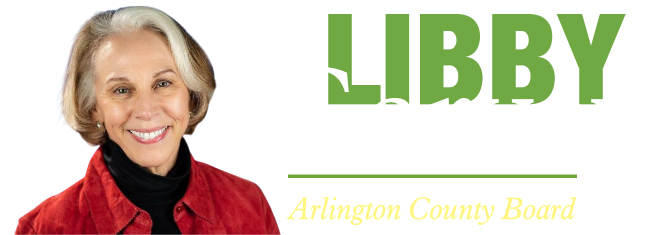Can you please help?
I’m reporting early this month because your Arlington County Board needs some quick help with our Virginia delegation on a bill which is important to Arlington and is coming up on Tuesday morning. This bill will lower property taxes on our two golf clubs by about $1.5 million per year. This would take away tax revenue that home owners will have to make up. I hope that you will join me in asking our Senators to vote no on the bill.

The bill would force us to assess the golf courses as if they were open space (parkland) rather than their “highest and best use” which is consistent with their residential zoning and as required by Virginia law. In Arlington, that “best” use is defined as a lot of single family homes in prime Arlington locations, and some with spectacular views. Contrary to some arguments, Arlington does NOT assess the land as if homes were on it nor as if they were ready to be built. There are no residential roads, water, sewer, or electrical lines on the golf courses. That lowers the assessed value considerably. In addition, some portions have steep slopes unsuitable for building. We do not assess those slopes as if they were buildable. The home lots around our golf courses are assessed at about $72/sq ft, potentially higher to over $100/sq ft. The golf courses are assessed at about $12/sq ft. If the bill passes, they will be assessed at between 30 and 47 CENTS per sq ft. This WOULD be unfair.


A controversial project

The tax rate
We ended our Saturday meeting by advertising the tax rate for next year. We adopt the tax rate when we adopt the budget in April. We can set the tax rate at what we advertised or lower, but not higher. Christian Dorsey and I again argued that we should advertise the tax rate a little higher than what we intend to adopt to give us flexibility to adapt to new information over the next couple of months. Both Metro and the golf course legislation I described above have the potential to change assumptions the Manager made when he developed the budget. The Schools budget is always strained by new students coming in, and difficult cuts may need to be made there.
Tax increases are painful for many people. Both Christian and I made clear we do NOT want to raise the tax rate, but that we simply wanted flexibility in case we needed it to avoid even more painful cuts to important programs. Christian and I voted to advertise a half penny above the current tax rate, to provide about $3.4 million in cushion just in case it becomes necessary. Our motion lost, as our colleagues Katie Cristol, John Vihstadt, and Erik Gutshall voted to advertise a tax rate equal to the current rate. Please note that because of rising property values, the “average” homeowner will see their real estate taxes go up by almost $300, even when the rate stays the same.
This begins our budget season which includes 11 work sessions, 2 public hearings, and more to get to our Board-adopted budget at our April meeting.
Finally, we started our Saturday meeting with a moment of silence for those killed at the most recent mass shooting in Parkland, Florida. I plan to join the student march downtown with my daughter and grandchildren on March 24th. Perhaps I will see you there. I am hopeful that this mass movement for sensible gun control led by young people may finally begin to have an effect.
As always, I hope you found this information useful.


